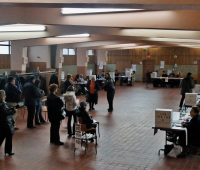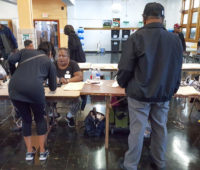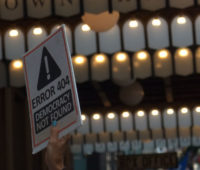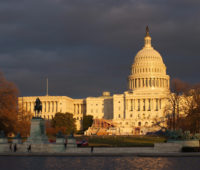Jaime Settle, a member of the SSRC Media & Democracy program’s advisory board, discusses her new book in the latest contribution to Democracy Papers. In Frenemies: How Social Media Polarizes America, she takes a deep look at how political information spreads on social media, emphasizing the importance of seemingly unpolitical posts and of exposure to the political opinions of people with whom we share only weak social ties.
Can representative democracies be strengthened to govern more effectively? The SSRC’s Anxieties of Democracy program is motivated by a concern about whether the core institutions of established democracies can capably address large problems in the public interest. The “Democracy Papers” highlight and summarize new research presented at conferences and workshops related to the Anxieties of Democracy program. Throughout the SSRC’s history, it has organized and sponsored committees and conferences on democracy, both in the United States and abroad. Most recently, before the Anxieties of Democracy program, the SSRC convened the National Research Commission on Elections and Voting in 2004, culminating in the publication of the report, Challenges Facing the American Electoral System: Research Priorities for the Social Sciences.
If you enjoy the “Democracy Papers,” you may also like our collection of reflection essays on the anxieties of democracy, The Inaugural Democracy Papers. These pieces were collected for the launch of the Anxieties of Democracy program in 2014–15.
Themes

Democratic Accountability in the Context of Appointed Commissions
by Victoria PottsConcluding our “Democratic Erosion” miniseries, Victoria Potts uses a prolonged political dispute over the fate of Confederate monuments in Memphis city parks to examine political accountability in democratic institutions. She examines the conflict between Memphis City Council, the Tennessee state legislature, and an appointed historical commission to ask whom appointed commissions should be accountable to, and when indirect or unelected power is justified in a democratic system.

Entertainer Politicians: Popular Icons and “Incumbency Advantage”
by Rachel RisoleoContinuing our “Democratic Erosion” miniseries of essays, Rachel Risoleo takes a look at the concept of incumbency advantage, arguing that this concept can help us explain the successful political candidacies of nonincumbent popular icons like Donald Trump in the United States and Jimmy Morales in Guatemala. She argues that celebrities who run for office are able to draw on advantages that are similar to those enjoyed by incumbent politicians, including name recognition, high levels of media exposure, and voters’ preference to identify with individual politicians.

Felon Disenfranchisement and Expert Assessments of Electoral Integrity
by Danielle TrujilloContinuing our “Democratic Erosion” miniseries, Danielle Trujillo examines democratic erosion through the lens of felon disenfranchisement in the United States and finds this issue is insufficiently incorporated into measures of electoral integrity. Comparing Louisiana and Mississippi, she notes what she argues is an incongruity: both share strict policies regarding incarceration and voting rights for former felons, but they differ dramatically in expert assessments of the integrity of the electoral process.

Voter Roll Purging in Ohio Is a Danger to Free and Fair Elections
by Sarah StradlingA June 2018 US Supreme Court decision upheld Ohio’s process for purging eligible voters from the voting rolls under certain conditions. Kicking off our “Democratic Erosion” miniseries, Sarah Stradling analyzes the background and potential implications of Ohio’s planned implementation of the National Voter Registration Act, and what it signals about the health of democracy when voting rights are restricted.

Unequal Political Voice in the New American Gilded Age
by Kay Lehman Schlozman, Henry Brady and Sidney VerbaIn the latest contribution to the Democracy Papers, Kay Schlozman, Henry Brady, and Sidney Verba give an authoritative overview of inequalities of political voice in the United States. Drawing on their recently published book, Unequal and Unrepresented: Political Inequality and the People’s Voice in the New Gilded Age, they show that not only has American political life long been dominated by inequalities of political voice, but also that these inequalities have been further accentuated by the increasing importance of money in politics.

Democracy in the Twenty-First Century: Toward New Models of Democratic Governance
by André Bächtiger and Claudia LandwehrAndré Bächtiger and Claudia Landwehr, in the latest contribution to the Democracy Papers, explore innovative ways to address citizen dissatisfaction with existing institutions of representative democracies. They argue that adding deliberation-oriented features to existing systems can boost citizen support for, and participation in, democratic life. As an example, they point to deliberative mini-publics, which create conditions for considered deliberation among citizens through supportive conditions such as information provision, expert hearings, and facilitator intervention.

The Multiple Forms of Bipartisanship: Political Alignments in US Foreign Policy
by Jordan TamaJordan Tama, an awardee of a Negotiating Agreement in Congress grant (a component of the SSRC’s Anxieties of Democracy program) identifies an intriguing anomaly: greater bipartisanship in the US Congress on foreign policy than domestic issues. Tama examines the different forms this aisle-crossing may take—sometimes in broad opposition to the president’s policy preferences, and at other times when intraparty factions unite across party lines. He sees ideology, interest group politics, and institutional incentives as the key sources for foreign policy bipartisanship, and concludes with how these dynamics are playing out in the Trump administration.

How Social Media Influences Democracy: New State-of-the-Field Report from a Recent Conference
by Kris-Stella TrumpThe Media & Democracy program has released a report on the proceedings from its April 2018 conference on "Social Media and Democracy." Here, program codirector Kris-Stella Trump provides an overview of the report and discusses the motivation behind the convening.










